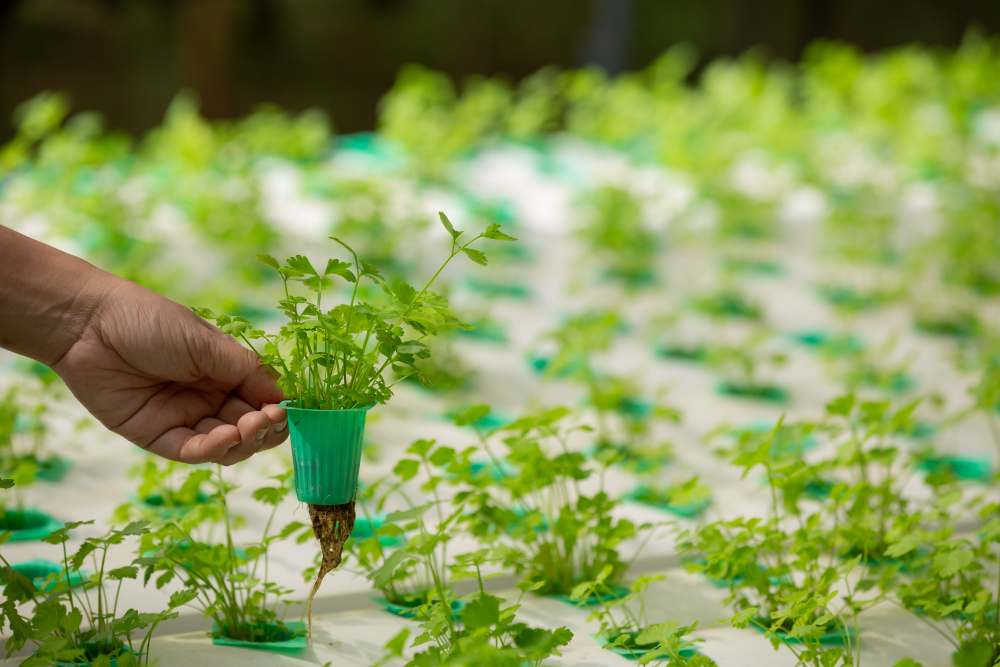As global concerns on sustainability and environmental stewardship evolve rapidly and intensify, natural farming emerges as a critical player on the agricultural horizon. Infused with a transformational capability, that works in harmony with nature, natural farming is based on agroecology and traditional practices that rely on the usage of natural resources. The fundamental principle of natural farming incorporates a chemical free, ecological farming method, which integrates crops, trees and livestock. The essential benefits of adopting this method of farming are a marked improvement in soil fertility, conservation of water and reduction in ecological impact. Natural farming promotes sustainability by prioritizing biodiversity.
Subhash Palekar, an agriculturalist from Belora village in Maharashtra is known to have developed the current natural farming model in the mid-1990s.
The Government of India, has been promoting natural farming, in a bid to empower and bring about more social and economic stability for the farmers. This practice of using locally available resources based on traditional knowledge, makes it a sustainable and viable option. The government has introduced several initiatives to promote natural farming such as:
National Mission on Natural Farming (NMNF)
The adoption of chemical free farming was introduced through this scheme for the farmers in 2023-24. The NMNF sought to share best practices by building institutional capacity, involving farmers in promotion strategies, and providing capacity building and support. Farmers who commit to natural farming based on the merits of the system are provided financial assistance of ₹15,000 per hectare per year for three years This helps them create on-farm infrastructure. The yardstick for the measurement of success of this initiative is based on an evaluation of the behavioral change in farmers in shifting to cow based, locally produced inputs from the previously used chemical-based inputs.
Paramparagat Krishi Vikas Yojana (PKVY):
Was launched in 2015. It was introduced as an extended component of Soil Health Management (SHM) under the CSS or the Centrally Sponsored Scheme, NMSA – National Mission on Sustainable Agriculture. This is strongly focused on the improvement of soil health
Bharatiya Prakritik Krishi Paddhati (BPKP)/ZBNF:
Was launched with a total outlay of ₹4,645.69 crore for six years (2019-20 to 2024-25) as a sub-scheme of the PKVY. With a strong accent on promoting indigenous practices, it liberates farmers from a dependence on externally purchased inputs. Under BPKP, financial assistance of Rs 12200/ha for 3 years is provided to farmers for cluster formation, capacity building. This also ensures continuous hand holding by trained personnel, certification and residue analysis. Its vision encompasses a coverage of 12 lakh ha in 600 major blocks of 2000 hectares in different states.
National Centre for Organic and Natural Farming (NCONF)
The promotion of chemical-free agricultural systems, such as natural, organic, and regenerative farming is done by the NCOF. It is a national knowledge repository for organic and bio-fertilizers, and gauges the market demand and supply for these.
India’s Finance Minister Nirmala Sitharaman announced in July this year, that Rs 1.52 lakh crores of the country’s 2024 budget would be allocated to agriculture and allied sectors. She also mentioned that the government of India would help one crore farmers over the next two years, to transition to natural farming, with adequate support from certification and branding.
Core principles driving natural farming:
A balanced and sustainable agricultural system is central to natural farming and is guided by the following principles:
Minimal soil disturbance: Tillage is avoided. Soil structure is maintained and beneficial microbial life is encouraged.
Improvement of soil fertility and health: by encouraging the usage of compost, green manures, and other organic materials to improve soil fertility and health.
Promotion of biodiversity: Enhancing ecosystem resilience and natural pest control by diverse range of plants and animals.
Focusing on Soil Health: Natural processes are incorporated to build and maintain healthy soil and the use of synthetic chemicals is eliminated.
Adopting natural pest management practices: Using natural predators, crop rotation, and other methods to manage pests and avoiding chemical pesticides.
Conserving water: Rainwater harvesting and mulching help conserve water.
Local adaptation for optimizing growth and sustainability: Practices are customized to suit the specific local environment and climate for optimal growth and sustainability.
Reducing dependency on external inputs: Practices that boost self-sufficiency are adopted.
Environmental and Climate Impact
Natural farming also termed as regenerative or ecological farming supports the environment and climate in numerous ways.
It improves soil fertility by reducing greenhouse gas emissions, that is achieved by avoiding the use of synthetic pesticides and fossil fuel-based fertilizers. Sediment runoffs into waterways is considerably reduced in healthy soils.
It enhances biodiversity by encouraging diverse plants and animals and building a more resilient ecosystem which attracts beneficial insects and pollinators. By embracing natural eco systems habitats for various species are created.
Natural farming practices that promote composting, and crop rotation help in enhancing the carbon sequestration. Climate resilient soil and crops that can withstand and adapt to the changing weather conditions emerge as a result of natural farming. Water management by improving water usage efficiency is another key objective. Practices like mulching and the addition of organic matter, increase the moisture retention level in the soil. The prevention of the use of synthetic fertilizers and pesticides, reduce the risk of water pollution from run off.
Waste management too is a major benefit. Organic waste is recycled and crop residues and animal manure are used as fertilizers. The dependency on external input is reduced and waste is minimized
Natural farming bears a positive impact on the climate by increasing the carbon sequestration, through its techniques of cover cropping and reduced tillage. A reduction of greenhouse gas emissions, promotes a healthier climate, enhances soil fertility and encourages biodiversity for furthering climate resilience. A substantial reduction in the carbon and nitrogen footprints of farming is achieved through lower energy use.
Health, Safety, and Economic Considerations
The wide ambit of natural farming encompasses significant health, safety and economic benefits too. The reduction in synthetic chemical usage results in fewer chemical residues on produce, protecting consumers—especially vulnerable groups like children and pregnant women—from hazardous effects. The crops that are grown in naturally nourished soil have a richer nutrient profile owing to the absence of nitrates and pesticides residue. The dairy products are healthier too, since naturally raised animals are fed and grazed on naturally grown feed or naturally managed pastureland.
From an economic perspective, natural farming represents a growing segment with rising demands from a health-conscious consumer. This trend also creates opportunities for market expansion and allows natural farmers to command higher prices for their products, boosting their income and contributing to economic growth.
Industry Perspective and Future Outlook
The practice of natural farming while yielding numerous benefits also comes with inherent risks. Andhra Pradesh which emerged as a forerunner in the adoption of ZBNF or Zero Budget Natural Farming displayed a reduction in yields. The research findings of agro scientists of the ICAR-IIFSR showed a 59% decline in the yield of wheat and 32% decline in the yield of basmati rice. Concerns have been voiced that it may adversely impact the food supply since it would be a challenging task to meet the demands of expanding food needs in a country as large as India. The future of natural farming is intrinsically linked to the broader agricultural industry’s commitment to sustainability and innovation. As consumer preferences continue to evolve, aligning agricultural practices with natural farming principles is not only beneficial but necessary.
For a seamless, productive and promising transition a strong collaboration among consumers, policymakers, researchers, and industry leaders will be crucial in overcoming challenges and driving the natural farming sector forward. Supportive government policies and international agreements will play a pivotal role in the expansion of organic farming, including the potential for growth in export markets through global partnerships.
Conclusion: Shaping a Sustainable Agricultural Future
The future of natural farming is promising. It could emerge as a key player in feeding the world’s growing population, improving food security, and preserving biodiversity. Natural farming is also vital in helping with environmental sustainability, water conservation, and reducing greenhouse gas emissions.
As the natural farming sector continues to expand, it stands at the forefront of the global movement towards sustainability and environmental responsibility. With its holistic approach centered on soil health, biodiversity, and climate resilience, natural farming is set to lead the transformation of agriculture. The industry’s ongoing innovation, strategic collaborations, and alignment with sustainability objectives will ensure that natural farming remains a critical driver in shaping a resilient and sustainable agricultural future.

